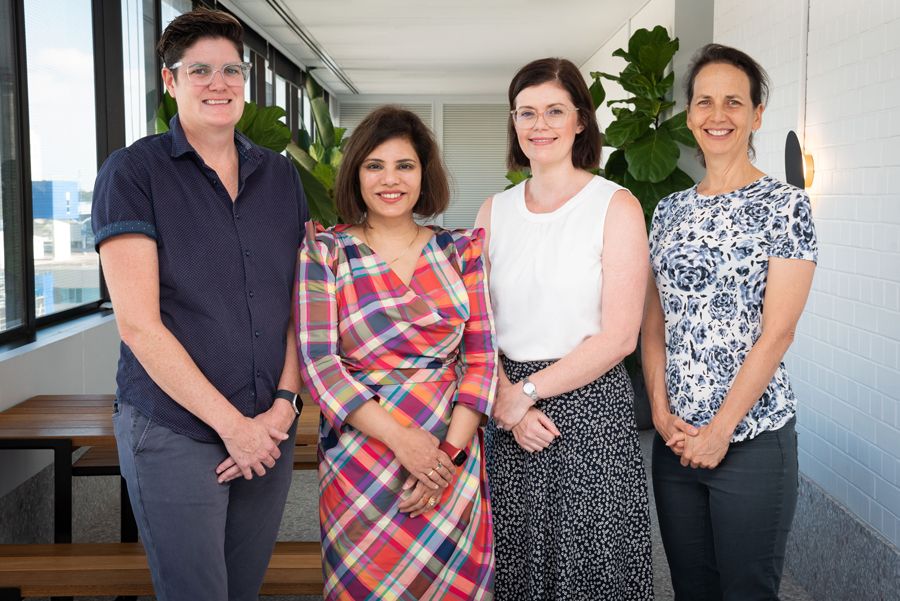We are extremely pleased to announce our Metro North Clinician Research Fellows for 2023

Dr Elizabeth Marsden, RADAR Emergency Falls and Orthopaedic Residential Model (REFORM) – a program of research
RADAR Rapid Response
Elizabeth’s team is addressing the need for innovations in health care of older adults in residential aged care facilities with the formation and delivery of a novel patient-centred model of care (MOC) that utilises a multidisciplinary outreach team of nurse practitioners, geriatricians, ED physicians and pharmacists, to diagnose and manage falls and upper limb fractures in older adults in their own place of residence rather that in the ED. The vision for the RADAR emergency falls and fracture orthopaedic residential model (REFORM) and Elizabeth’s fellowship is to provide value-based pragmatic ED substitution service enabling timely access to specialist care for older adults in residential aged care facilities. Her research program will comprise three interrelated projects:
- a process evaluation of the REFORM MOC structure, processes and outcomes
- a diagnostic accuracy of bedside point-of-care ultrasound (POCUS) for older adults with a suspected acute distal radius fracture
- a randomised controlled trial (RCT) in residents with dementia and a distal radius fracture to determine if plaster cast colour leads to fewer cast removals
A/Prof Alka Kothari, Supporting fathers during a traumatic pregnancy: Towards holistic care
Obstetrics & Gynaecology, Redcliffe Hospital
Alka’s mission is to is to build sustainable systems to universally identify and proactively support ‘at risk’ fathers, especially after a traumatic pregnancy and childbirth. Unfortunately, maternal or fetal complications occur in up to one-third of pregnancies resulting in serious mental health consequences for the father, mother, and the entire family unit. While there is targeted support afforded to women during pregnancy and postpartum, this is not the case for fathers. Fathers are also typically reluctant to access and accept care and support due to stigma and societal constraints, which highlights the importance of tailored father-friendly solutions. Alka’s aim is to develop appropriate interventions to support the psychological health and wellbeing of fathers, particularly after a traumatic event. Her vision is to broaden the scope of obstetric services to be father-inclusive, holistic and equitable which will in turn target a major unmet need to ensure a best start to life for all children by promoting the health and wellbeing of both mothers and fathers.
Dr Julie Adsett, Time to Get Moving: Creating active hospitals to reduce hospital-associated functional decline
Physiotherapy, Royal Brisbane and Women’s Hospital
Julie’s intention is to create ‘active hospitals’ where staff and systems safely support greater physical activity to optimise patients’ functional recovery after acute illness and surgery. Underpinned by multidisciplinary clinical and organisational expertise, consumers’ lived experience, contemporary implementation science methods and rigorous real-world evaluation, this collaborative research program will create, synthesise, implement, evaluate and share evidence to improve functional outcomes and foster a culture that prioritises function and physical activity.
Dr Sarah Andersen, Using prebiotic fibre supplementation to improve patient outcomes during treatment for haematological malignancies
Dietetics and Food Services, Royal Brisbane and Women’s Hospital
Sarah will use her Fellowship to complete research that builds the evidence and addresses knowledge gaps on how nutrition can help optimise patient outcomes during haematological cancer treatment. Her research will assess the feasibility of prebiotic fibre supplementation and assess if it can protect a healthy microbiome and reduce complications. It will build the evidence on optimal nutrition support during haematological cancer treatment to enable future translation of these findings into clinical practice, to improve patient care and outcomes.
